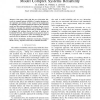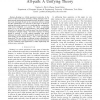3122 search results - page 46 / 625 » A Theory of Network Equivalence |
113
click to vote
JCP
2007
14 years 11 months ago
2007
Abstract— This paper deals with the use of Bayesian Networks to compute system reliability of complex systems under epistemic uncertainty. In the context of incompleteness of rel...
113
click to vote
ICDCS
2011
IEEE
13 years 11 months ago
2011
IEEE
—Routing is a critical operation in networks. In the context of data and sensor networks, routing strategies such as shortest-path, multi-path and potential-based (“all-path”...
CORR
2007
Springer
14 years 11 months ago
2007
Springer
The subject of this article is the long standing open problem of developing a general capacity theory for wireless networks, particularly a theory capable of describing the fundam...
106
click to vote
CSL
2007
Springer
15 years 6 months ago
2007
Springer
Normal form bisimulation is a powerful theory of program equivalence, originally developed to characterize L´evy-Longo tree equivalence and Boehm tree equivalence. It has been ada...
IPSN
2003
Springer
15 years 5 months ago
2003
Springer
Sensor networks have emerged as a fundamentally new tool for monitoring spatially distributed phenomena. This paper investigates a strategy by which sensor nodes detect and estima...


